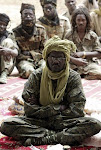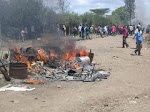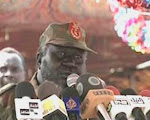If we are to achieve a richer culture, rich in contrasting values, we must recognize the whole gamut of human potentialities, and so weave a less arbitrary social fabric, one in which each diverse human gift will find a fitting place – Margaret Mead
In the previous features, "Integral" discussed the lack of democratic principles in South Sudan and how such disunite the people of South Sudan. It observed the values or pillars of democracy: sovereignty of the people; government based upon consent of the governed; majority rule; minority rights; guarantee of basic human rights; free and fair elections; equality before the law; due process of law; constitutional limits on government; social, economic, and political pluralism; values of tolerance, pragmatism, cooperation, and compromise, (http://usinfo.state.gov/products/pubs/whatsdem/whatdm2.htm).
It promised to look into each one of these pillars. It has already examined "sovereignty of the people"; "government based upon consent of the governed"; and "majority rule." Today, it is looking at "Minority Rights" and evaluate the relationship between the majority tribes/parties and those that fall under the category of the minority in South Sudan.
Minority Rights is a terminology used to describe what is morally and legally justifiable to a person, group of people and nationalities regarded as minorities around the world, including sexual minorities in some parts of the world, especially in the Western World. Linking this up to this column's argument, it's important to note that South Sudan has many tribes and political parties.
There are majority and minority tribes in South. There are also majority and minority parties in South Sudan. Dinka and Nuer are majority tribes in South Sudan and as such parties led by these large tribes would always become majority parties. This is true because in order to make parties look more nationalistic in character, parties all over Africa welcome into their membership people from other tribes.
How do the majority tribes and parties in South Sudan behave towards the minority ones? Do they take into consideration the plight of the minority tribes and parties? Do they think that it is morally and legally right to protect the rights of minority tribes and parties in South Sudan just like it is supposed to be the case in this contemporary era of the 21st century?
It would actually be difficult to answer the questions above or to discuss a particular tribe and/or political party before mentioning which tribe ruled South Sudan, when and how it behaved during their tenure in office? South Sudan has witnessed the administration of two largest tribes in South Sudan: the Nuer tribe lead by United Democratic Salvation Front, formed during the Khartoum Peace Agreement. The government was led by the Coordinating Council for South Sudan (CCSS). The second one is the Dinka tribe which dominates the Sudan People's Liberation Movement/Army (SPLM/A). The government of South Sudan (GoSS) was created by the Comprehensive Peace Agreement (CPA). These two tribes will offer "Integral" this opportunity to observe what majority parties and tribes could do in South Sudan when in power.
Before observing the questions above, let us look at what the terminology 'Minority Rights' embodies – at least from the scientific point of view. Before that though, let us note that the concurrent usage of tribe and political party in the context of South Sudan is that tribes in South Sudan do dominate political parties. In other words, tribes follow their traditional (tribal) leaderships wherever they are in a political party.
The term minority rights embodies two separate concepts: first, normal individual rights as applied to members of racial; ethnic; class; religious; linguistic or sexual minorities; and second: collective rights accorded to minority groups. The term may also apply simply to individual rights of anyone who is not part of a majority decision.
Civil rights movements often seek to ensure that individual rights are not denied on the basis of membership in a minority group. There are many political bodies which also feature minority group rights. This might be seen in affirmative action quotas, or in guaranteed minority representation in a consociational state.
The majority tribes in South Sudan, especially some individuals within the SPLM/A have never hidden their intentions to dominate. Those few individuals within the Dinka and Nuer communities have said over and over that they are just large enough; and that they have to dominate whether anybody likes it or not. These individuals are on record and whether or not they said or are saying this with the help of anybody, it is immaterial. Because domination, oppression and suppression of smaller tribes or parties by majority ones is a direct abuse of minority rights. Feeling no remorse because someone badly needs power is lack of consideration to the rights of minority groups within an entity.
In early 1980s, South Sudan was made to believe that it had taken the British 50 years to rule the Sudan; and that it will take the Dinka tribe alone100 years to rule the Equatorians and of course by extension the rest of South Sudan. It is wondering to imagine how many more years will the Nuer ask for if the domination is to alternate between majority tribes in South Sudan!
During their era which was ushered in by the Khartoum Peace Agreement (KPA), however, the Nuer tribe had asserted that it was their time to dominate for a while. With no shame, the Nuer tribe seriously dominated the rest of South Sudan in the absence of the Dinka between 1998 and 2005. These seven years of the CCSS existence were led by the Nuer – in the persons of Dr Riek Machar Teny-Dhurgon, Lt-Gen. (Rtd) Gatlwak Deng and Dr Riek Gai Kok.
This mutual ambition to dominate has encouraged and continues to encourage the abuse of minority rights in South Sudan. The minorities in South Sudan were not happy then and are not happy today because they believe that the domination and the abuse of their minority rights continue unabated. Some of these minorities do ask as to when they will be happy in their own home if they cannot be happy after their liberation from the yoke of oppression? Most of them see no moral and legal justification for what they truly see as oppression extended to them by none other than a brother, a liberator.
It is a moral and legal obligation for the majority party or tribe to respect the rights of the minorities in South Sudan. Persistence that majority tribes ought to rule and thus abuse the rights of the minorities would only work to create differences between the people of South Sudan. These differences in fact have already developed into dislike – to say more strongly – hatred. Hatred has never and will never promote the cohesion of the people of South Sudan. Cohesion should be the thing to aim at badly to help advance the cause of unity between the South Sudanese people.
"Integral" would like to look at other perspectives of minority rights as conceived by some national and international organisations around the world, including the United Nations. This is important so that the reader understands that minority rights are guaranteed by law in some civilized countries around the world, including those the people in South Sudan admire. It should thus be noted that some of the perspectives highlighted bellow did exist for quit a long time as could be observed from the Hungarian Diet (parliament).
The question to ask is: are the educated amongst the majority tribes and parties in South Sudan unable to explore knowledge and understand that it is morally and legally incorrect to suppress minorities? The answer is no; the educated amongst the majority have explored the world, acquired knowledge and know that it is morally and legally wrong to oppress minorities but they do not care. It is the 'I don't care attitude' which will land all those who deliberately oppressed minorities into future troubles. Suppression of any kind, let alone that of the minorities, is a crime and those responsible will have to be brought to book when charges are brought against them in future.
Minority rights as conceived by some national and international organisations around the world, reveal that, the first minority rights were created by Diet of Hungary in 1849. Minority rights, as applied to ethnic, religious or linguistic minorities and indigenous peoples, are an integral part of international human rights law. Like children's rights, women's rights and refugee rights, minority rights are a legal framework designed to ensure that a specific group which is in a vulnerable, disadvantaged or marginalised position in society, is able to achieve equality and is protected from persecution.
The first post-war international treaty to protect minorities, designed to protect them from the greatest threat to their existence, was the U.N. Convention on the Prevention and Punishment of the Crime of Genocide. Subsequent human rights standards that codify minority rights include the International Covenant on Civil and Political Rights (Article 27), the United Nations Declaration on the Rights of Persons Belonging to National or Ethnic, Religious and Linguistic Minorities, two Council of Europe treaties (the Framework Convention for the Protection of National Minorities and the European Charter for Regional or Minority Languages, and the OSCE Copenhagen Document of 1990.
Minority rights cover protection of existence, protection from discrimination and persecution, protection and promotion of identity, and participation in political life. To protect minority rights, many countries have specific laws and/or commissions or ombudsman institutions (for example the Hungarian Parliamentary Commissioner for National and Ethnic Minorities' Rights).
While initially, the United Nations treated indigenous peoples as a sub-category of minorities, there is an expanding body of international law specifically devoted to them, in particular Convention 169 of the International Labour Organization. Attempts to codify the rights of sexual minorities in international human rights law have met with strong opposition from a number of member states of the United Nations.
Having observed minority rights as conceived by some national and international organisations around the world, including the United Nations, it is only fair to call on GoSS, led by the First Vice-President of the republic, H.E. 1st-Lt-Gen. Salva Kiir Mayardit, to implement the protection of minority groups in South Sudan. The protection of minority rights is enshrined in the constitution of South Sudan in Part Two: bill of rights.
This call does not mean that the situation in South Sudan has gone out of hand in as far as the infringements on the rights of minorities are concerned. The situation will go out of hand if it is ignored and it is on this background that the leadership of GoSS is hereby asked to prevent this from happening. As mentioned earlier in this column, minorities are starting to develop hatred towards the majority tribes. This is caused by the failure to address issues as they happen.
Majority tribes and parties in South Sudan did and continue to do a lot of bad things against the minority tribes and parties and nothing is done to them. Even those from the majority tribes or parties arrested for committing crimes are sometimes released or set free, thus escaping justice. It is understood that Rome was not built in a day; but signs of building Rome did appear from the first day. It is the signs of building the South that the people want to see now in order to believe that the future is indeed bright.







No comments:
Post a Comment